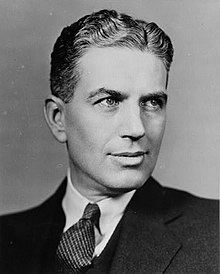Rexford Guy Tugwell
| Rexford Tugwell | |
|---|---|
 |
|
| Governor of Puerto Rico | |
|
In office September 19, 1941 – September 2, 1946 |
|
| President |
Franklin D. Roosevelt Harry S. Truman |
| Preceded by | José Miguel Gallardo |
| Succeeded by | Jesús T. Piñero |
| Personal details | |
| Born |
Rexford Guy Tugwell July 10, 1891 Sinclairville, New York |
| Died | July 21, 1979 (aged 88) Santa Barbara, California |
| Political party | Democratic (1932-1948), Progressive Party (1948) |
| Profession | Economist, Academician |
Rexford Guy Tugwell (July 10, 1891 – July 21, 1979) was an economist who became part of Franklin D. Roosevelt's first "Brain Trust," a group of Columbia University academics who helped develop policy recommendations leading up to Roosevelt's New Deal. Tugwell served in FDR's administration until he was forced out in 1936. He was a specialist on planning and believed the government should have large-scale plans to move the economy out of the Great Depression because private enterprise was too frozen in place to do the job. He helped design the New Deal farm program and the Resettlement Administration that moved subsistence farmers into small rented farms under close supervision. His ideas on suburban planning resulted in the construction of Greenbelt, Maryland, with low-cost rents for relief families. He was denounced by conservatives who said his government-imposed planning violated the values of individualism.
Roosevelt appointed Tugwell as Governor of Puerto Rico during World War II (1941-1946), and later president of the United Fruit Company. He became a professor at various universities, with lengthy service at the University of Chicago and the University of California at Santa Barbara. He wrote twenty books, covering the politics of the New Deal, biographies of major politicians, issues in planning, and memoirs of his experiences.
Rexford Tugwell was born in 1891 in Sinclairville, New York. In his youth, he gained an appreciation for workers’ rights and liberal politics from the works of Upton Sinclair, James Bryce, Edward Bellamy,Frederick Winslow Taylor, and Charles Richard van Hise. Tugwell began studying economics in graduate work at the Wharton School of the University of Pennsylvania, and completed his doctorate at Columbia University. At university, he was influenced by the teaching of Scott Nearing and Simon Patten, as well as the writings of John Dewey in philosophy.
...
Wikipedia
